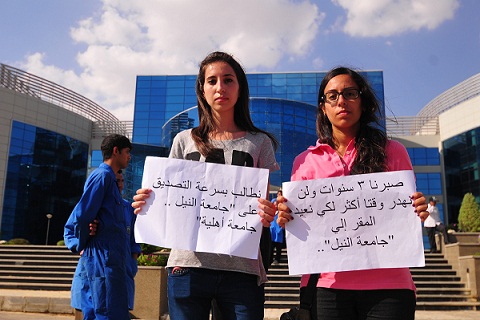CAIRO: A number of Muslim Brotherhood (MB) lawyers and human rights activists were prevented from attending the military tribunal of 40 Brotherhood members on Tuesday, lawyers told Daily News Egypt.
The case, which was previously dismissed from a civilian court, was transferred to a military court after direct orders from President Mubarak.
“In the case of a felony, a lawyer is allowed to defend his or her client even without a documented power of attorney. The lawyer’s physical presence legally represents an effective power of attorney. So preventing all these lawyers from entering is clearly an illegal action that is part of the regime’s policy of thuggery, Mohamed Abdel Baey who is defending Ameer Basaam, one of 40 detained MB members, told Daily News Egypt.
The head judge allowed some family members and a handful of attorneys who had registered with the court from the beginning of the case to enter the courtroom.
During the last court session on Sunday Aug. 19, the court heard the testimony of lieutenant, Atef El Husseiny.
MB lawyers objected to the fact that El Husseiny was reading his testimony from a notebook.
The defense also requested that the case be adjourned until a complete investigation of missing evidence is concluded.
This evidence included a safe belonging to MB businessman Hassan Malek, which contained jewelry and large sums of money. After being impounded, it was later found empty by prosecutors.
“I think they are not letting the press or international monitors into the court room because they want to keep the public in the dark about the insides of the case, Abdel Baey said.
Last Sunday Brotherhood leader Essam El Erian was also detained in Giza for charges including inciting hatred against the Egyptian government.
“I think this whole case is payback for the Brotherhood’s militia displays at Al Azhar University last year, Abdel Baey said.
Amaar El Kuraby of the Paris-based Arab Committee for Human Rights, was among those prevented from entering the courtroom on Tuesday.
“This is the fourth time we send someone to monitor the trial and they are not allowed to enter, Kuraby told Daily News Egypt.
Kuraby criticized presidential intervention into the trial of civilians and called it a compromise of the judiciary’s independence.
Among Kuraby’s concerns was the fact that a financial report that was to be prepared by the prosecution outlining instances of money laundering, was missing.
“I think this it is a highly political case that will definitely affect Egypt’s reputation and human rights record, Kuraby said.

